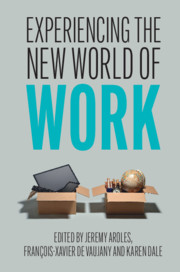Book contents
- Experiencing the New World of Work
- Experiencing the New World of Work
- Copyright page
- Contents
- Tables
- Contributors
- Foreword
- Introduction
- Part I Experiencing at Work
- Part II Digital Platforms and the New World of Work
- Part III Politics, Imaginaries and Others in the New World of Work
- Conclusion
- Afterword
- Index
- References
Part III - Politics, Imaginaries and Others in the New World of Work
Published online by Cambridge University Press: 24 December 2020
- Experiencing the New World of Work
- Experiencing the New World of Work
- Copyright page
- Contents
- Tables
- Contributors
- Foreword
- Introduction
- Part I Experiencing at Work
- Part II Digital Platforms and the New World of Work
- Part III Politics, Imaginaries and Others in the New World of Work
- Conclusion
- Afterword
- Index
- References
Summary

- Type
- Chapter
- Information
- Experiencing the New World of Work , pp. 179 - 252Publisher: Cambridge University PressPrint publication year: 2021

